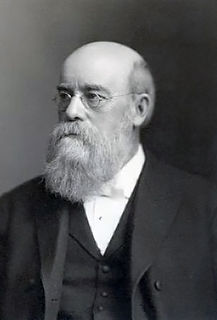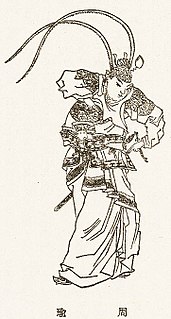A Quote by Robert A. Heinlein
The most noble fate a man can endure is to place his own mortal body between his loved home and the war's desolation.
Related Quotes
It is God's earth out of which man is taken. From it he has his body. His body belongs to his essential being. Man's body is not his prison, his shell his exterior, but man himself. Man does not "have" a body; he does not "have" a soul; rather he "is" body and soul. Man in the beginning is really his body. He is one. He is his body, as Christ is completely his body, as the Church is the body of Christ
I believe that this hairless embryo with the aching, oversize brain case and the opposable thumb, this animal barely up from the apes, will endure --will endure longer than his home planet, will spread out to the other planets, to the stars, and beyond, carrying with him his honesty, his insatiable curiosity, his unlimited courage --and his noble essential decency. This I believe with all my heart.
All of man's ills are due to his lack of knowing God within him. The perfection of God's universe is founded upon its perfection of Balance. All of man's ills are caused by toxic poisons generated in his body through unbalance affecting his power of control over the functions of his electric body. Man, as an extension of God, is creator of his own electric body. He is master of his electric body to the extent of his knowing the Light of God in him. ... God says to man: »What I do, ye shall do«, but man is unbelieving for long ages.
He loved me. He'd loved me as long as he he'd known me! I hadn't loved him as long perhaps, but now I loved him equally well, or better. I loved his laugh, his handwriting, his steady gaze, his honorableness, his freckles, his appreciation of my jokes, his hands, his determination that I should know the worst of him. And, most of all, shameful though it might be, I loved his love for me.
The first man . . . ventured to call food and nourishment the parts that had a little before bellowed and cried, moved and lived. How could his eyes endure the slaughter when throats were slit and hides flayed and limbs torn from limb? How could his nose endure the stench? How was it that the pollution did not turn away his taste, which made contact with the sores of others and sucked juices and serums from mortal wounds?
How much reverence has a noble man for his enemies!--and such reverence is a bridge to love.--For he desires his enemy for himself, as his mark of distinction; he can endure no other enemy than one in whom there is nothing to despise and very much to honor! In contrast to this, picture "the enemy" as the man of ressentiment conceives him--and here precisely is his deed, his creation: he has conceived "the evil enemy," "the Evil One," and this in fact is his basic concept, from which he then evolves, as an afterthought and pendant, a "good one"--himself!





































